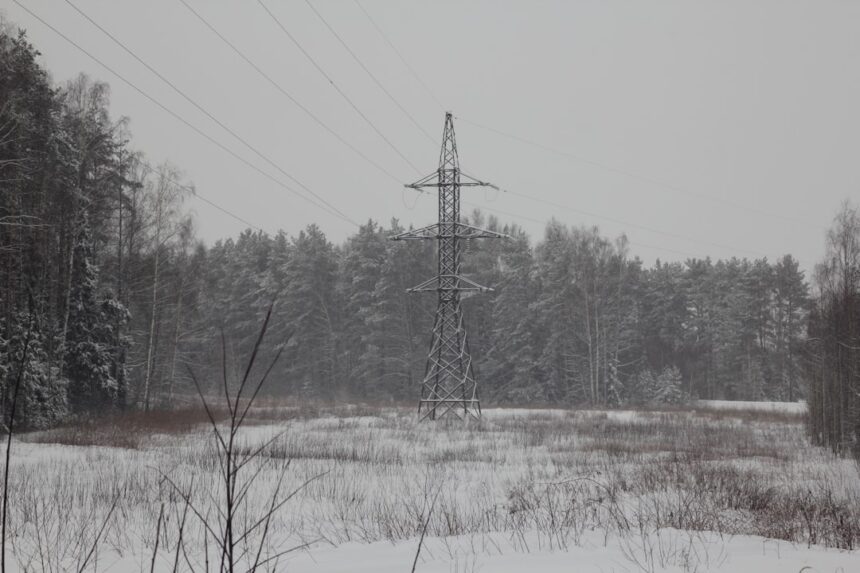Europe’s energy landscape has long been shaped by its intricate relationship with Russia, a country rich in natural resources, particularly fossil fuels. This dependency has become a focal point of discussion, especially in light of recent geopolitical tensions and the urgent need for energy security. As European nations grapple with the implications of relying heavily on Russian energy supplies, the conversation has shifted towards finding sustainable solutions that can mitigate this dependency.
The stakes are high, as energy security is not merely an economic issue but also a matter of national security and political stability. The reliance on Russian energy has profound implications for Europe, influencing everything from domestic policies to international relations. The continent’s energy needs are vast, and Russia has historically been a key supplier of oil and natural gas.
As Europe seeks to navigate this complex landscape, understanding the historical context and current dynamics of its energy dependency on Russia becomes essential.
Key Takeaways
- Europe’s energy dependency on Russia has significant geopolitical implications.
- Natural gas plays a crucial role in Europe’s energy dependency on Russia.
- Efforts are being made to reduce Europe’s energy dependency on Russia.
- Renewable energy can play a key role in reducing Europe’s energy dependency on Russia.
- Europe’s energy relationship with Russia has important economic and environmental implications.
Historical context of Europe’s energy relationship with Russia
The roots of Europe’s energy dependency on Russia can be traced back to the post-World War II era when the Soviet Union emerged as a significant player in the global energy market. During the Cold War, Europe relied on Soviet oil and gas to fuel its economies, creating a bond that would persist even after the dissolution of the Soviet Union in 1991. The establishment of pipelines such as the Druzhba pipeline in the 1960s solidified this relationship, allowing for the efficient transport of oil across Eastern Europe to Western markets.
As the years progressed, Europe’s dependence on Russian energy sources deepened, particularly in the wake of the 2000s when Russia began to leverage its energy resources as a tool of foreign policy. The construction of new pipelines, such as Nord Stream and South Stream, further integrated Russian gas into European markets. This historical context is crucial for understanding the current dynamics at play, as it highlights how deeply entrenched these energy ties have become over decades.
Current state of Europe’s energy dependency on Russia

In recent years, Europe’s energy dependency on Russia has reached critical levels, with approximately 40% of the continent’s natural gas imports coming from Russian sources. This reliance poses significant risks, particularly in light of geopolitical tensions, such as the annexation of Crimea in 2014 and ongoing conflicts in Ukraine. These events have raised alarms about the vulnerability of European nations to potential supply disruptions and price volatility driven by political decisions made in Moscow.
The current state of affairs is characterized by a growing awareness among European leaders about the need to diversify energy sources and enhance energy security. While some countries have made strides in reducing their dependency on Russian gas, others remain heavily reliant due to existing infrastructure and long-term contracts. This uneven landscape complicates efforts to achieve a unified European approach to energy independence, as member states grapple with their unique circumstances and energy needs.
The role of natural gas in Europe’s energy dependency on Russia
| Metrics | Data |
|---|---|
| European Natural Gas Consumption | Approximately 550 billion cubic meters per year |
| Russia’s Share of European Natural Gas Imports | Around 40% |
| Dependency on Russian Gas | Varies by country, with some relying on Russia for over 75% of their natural gas imports |
| Diversification Efforts | Investments in LNG terminals, pipeline connections, and renewable energy sources |
| Geopolitical Concerns | Impact of Russian gas supply on European security and foreign policy |
Natural gas plays a pivotal role in Europe’s energy dependency on Russia, serving as a primary source for heating, electricity generation, and industrial processes.
This growing reliance on natural gas has made Europe particularly vulnerable to fluctuations in supply and pricing dictated by Russian exports.
The strategic importance of natural gas is underscored by its role in shaping European energy policies. Many countries have invested heavily in infrastructure to facilitate the importation of Russian gas, including pipelines and storage facilities. However, this dependence also raises concerns about energy security, as any disruption in supply could have cascading effects on economies and households across Europe.
As such, finding alternative sources of natural gas has become a priority for many European nations seeking to reduce their vulnerability.
Impact of Europe’s energy dependency on Russia on geopolitics
Europe’s energy dependency on Russia has significant implications for geopolitics, influencing diplomatic relations and security strategies across the continent. The reliance on Russian energy supplies has often been viewed as a double-edged sword; while it provides economic benefits, it also creates leverage for Russia in its dealings with European nations. This dynamic has led to tensions within Europe itself, as member states grapple with differing levels of dependency and varying approaches to foreign policy regarding Russia.
The geopolitical ramifications are particularly evident during times of crisis, such as military conflicts or economic sanctions. For instance, during the Ukraine crisis, European nations faced difficult choices regarding their energy policies and relationships with Russia. Some countries advocated for stronger sanctions against Moscow, while others hesitated due to their reliance on Russian gas.
This divide highlights how energy dependency can complicate collective action within Europe and influence broader geopolitical alignments.
Efforts to reduce Europe’s energy dependency on Russia

In response to the challenges posed by their reliance on Russian energy supplies, European nations have initiated various efforts aimed at reducing this dependency. One significant approach has been the diversification of energy sources through investments in alternative suppliers and infrastructure projects. Initiatives such as the Southern Gas Corridor aim to bring gas from countries like Azerbaijan and Turkmenistan into Europe, thereby reducing reliance on Russian imports.
Additionally, European leaders have recognized the importance of enhancing interconnectivity among member states’ energy systems. By improving infrastructure for electricity and gas transmission across borders, Europe can create a more resilient energy market that is less susceptible to external shocks. These efforts reflect a growing consensus among European nations that achieving energy independence requires not only diversification but also greater collaboration and integration within the EU.
Alternative energy sources for Europe
As Europe seeks to reduce its dependency on Russian energy supplies, exploring alternative sources has become paramount. Renewable energy sources such as wind, solar, and hydroelectric power are at the forefront of this transition. Many European countries have made significant investments in renewable technologies, aiming to harness their abundant natural resources to meet growing energy demands sustainably.
In addition to renewables, nuclear power remains a critical component of Europe’s energy mix for several countries. While some nations are phasing out nuclear energy due to safety concerns, others view it as a viable option for achieving energy independence while minimizing carbon emissions. The diversification of energy sources not only enhances security but also aligns with broader climate goals set by European nations to combat climate change.
The role of renewable energy in reducing Europe’s energy dependency on Russia
Renewable energy plays a transformative role in reducing Europe’s dependency on Russian fossil fuels. As technological advancements continue to drive down costs associated with solar panels and wind turbines, many countries are increasingly turning towards these sustainable options to meet their energy needs. The European Union has set ambitious targets for renewable energy production, aiming for at least 32% of its total energy consumption to come from renewable sources by 2030.
The shift towards renewables not only enhances energy security but also contributes to environmental sustainability. By investing in clean technologies, Europe can reduce its carbon footprint while simultaneously decreasing its reliance on imported fossil fuels. This dual benefit positions renewable energy as a cornerstone of Europe’s strategy to achieve both energy independence and climate goals.
The economic implications of Europe’s energy dependency on Russia
Europe’s economic landscape is intricately linked to its energy dependency on Russia, with significant implications for both growth and stability. The reliance on imported fossil fuels exposes European economies to price volatility and supply disruptions that can have far-reaching consequences. Fluctuations in global oil and gas prices can impact inflation rates, trade balances, and overall economic performance across member states.
Moreover, the economic ramifications extend beyond immediate financial concerns; they also influence investment decisions and long-term planning within industries reliant on stable energy supplies. As European nations strive for greater energy independence, they must consider not only the costs associated with transitioning to alternative sources but also the potential benefits that come from reduced vulnerability to external pressures.
Environmental concerns related to Europe’s energy dependency on Russia
The environmental implications of Europe’s dependency on Russian fossil fuels cannot be overlooked. The extraction and consumption of oil and gas contribute significantly to greenhouse gas emissions and climate change—a pressing global challenge that demands urgent action. As Europe grapples with its reliance on these resources, there is an increasing recognition that transitioning towards cleaner alternatives is essential not only for enhancing energy security but also for safeguarding the environment.
Furthermore, environmental concerns extend beyond climate change; they also encompass issues related to air quality and ecosystem degradation resulting from fossil fuel extraction processes. By prioritizing renewable energy development and reducing dependence on Russian fossil fuels, Europe can take meaningful steps towards addressing these environmental challenges while fostering sustainable economic growth.
The future of Europe’s energy relationship with Russia
Looking ahead, the future of Europe’s energy relationship with Russia remains uncertain but is likely to be shaped by ongoing geopolitical developments and shifts in global energy markets. While some European nations may continue to rely on Russian supplies due to existing infrastructure and contracts, there is a clear trend towards diversification and increased investment in renewable technologies. As Europe navigates this complex landscape, it will be essential for policymakers to balance immediate energy needs with long-term sustainability goals.
The transition towards greater energy independence will require collaboration among member states, innovative solutions for integrating renewable sources into existing grids, and continued efforts to enhance interconnectivity across borders. In conclusion, Europe’s relationship with Russian energy is multifaceted and evolving. As geopolitical tensions persist and environmental concerns mount, the urgency for change becomes increasingly apparent.
By embracing alternative sources of energy and prioritizing sustainability initiatives, Europe can pave the way towards a more secure and resilient future—one that is less dependent on external influences while fostering economic growth and environmental stewardship.
Europe’s reliance on Russian energy has been a topic of significant concern, especially in light of geopolitical tensions and the need for energy diversification. An insightful article discussing this issue can be found on the website “In The War Room.” The article delves into the complexities of Europe’s energy dependency and explores potential strategies for reducing reliance on Russian resources. For a more detailed analysis, you can read the full article by visiting this link. This piece provides a comprehensive overview of the current energy landscape and the challenges Europe faces in securing a stable and independent energy future.
WATCH THIS! The FSB’s Hidden War on Europe’s Pipelines
FAQs
What is Europe’s reliance on Russian energy?
Europe’s reliance on Russian energy refers to the significant dependence of European countries on energy imports from Russia, particularly natural gas and oil.
Why is Europe reliant on Russian energy?
Europe’s reliance on Russian energy is primarily due to the geographical proximity of Russia and the availability of vast reserves of natural gas and oil in the country. Additionally, historical trade relationships and infrastructure connections have also contributed to this reliance.
Which European countries are most reliant on Russian energy?
Several European countries, particularly in Eastern and Central Europe, are highly reliant on Russian energy, including Germany, Italy, Turkey, and the Baltic states. These countries rely on Russian natural gas for a significant portion of their energy needs.
What are the implications of Europe’s reliance on Russian energy?
The reliance on Russian energy exposes European countries to potential supply disruptions and geopolitical risks, as well as the influence of Russian energy policies on European energy markets. It also raises concerns about energy security and diversification of energy sources.
What measures are being taken to reduce Europe’s reliance on Russian energy?
European countries and the European Union are taking various measures to reduce their reliance on Russian energy, including diversifying energy sources, increasing energy efficiency, investing in renewable energy, and developing alternative energy supply routes, such as the Southern Gas Corridor and liquefied natural gas (LNG) terminals.



